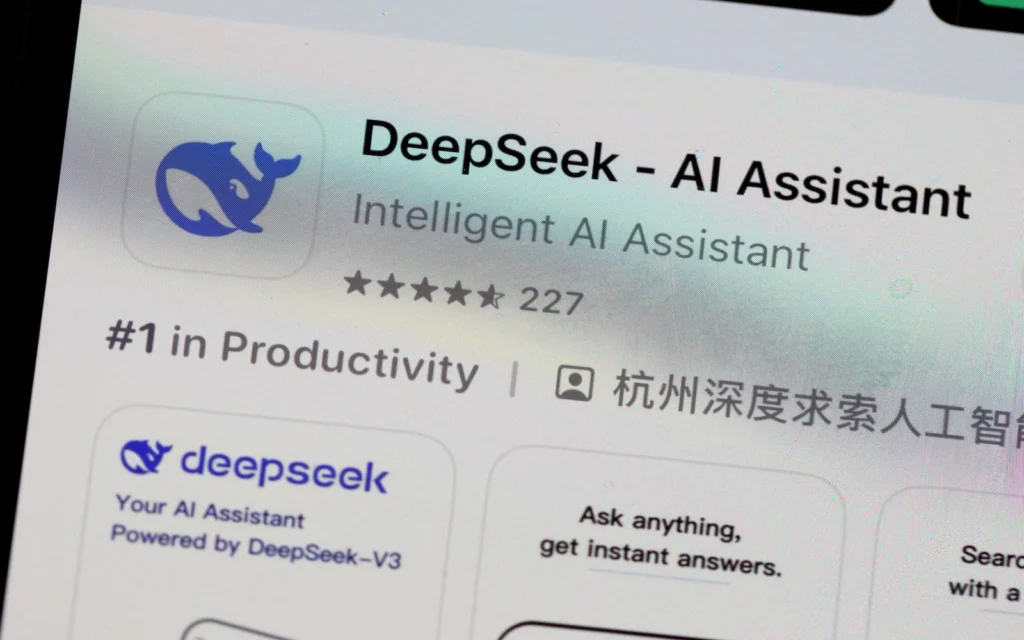
DeepSeek, a Chinese AI startup, has recently shown great prominence in the rapidly growing artificial intelligence era, and has also triggered some alarm bells among U.S. technology companies. This scenario has also attracted political attention. While it has been rising at large, it has also been said as a “wake-up call” for American tech firms. It is said so because it challenges their dominance in the AI sector. When the new launch, i.e. advanced AI assistant, R1 came, DeepSeek not only gained significant advancement, but also caused widespread market repercussions, that resulted in massive losses for U.S. companies. Those companies which were involved in AI hardware and software development, were the ones to get most damage.
The Boom of DeepSeek and its influence on U.S. Tech Firms
DeepSeek initiated in 2023, has rapidly made a great mark in the fighting world of AI with its entirely different approach to developing large language models (LLMs). Now, what’s new is that in January 2025, DeepSeek has created its flagship product, the R1 AI assistant, which quickly gained a lot of attention due to its cutting-edge abilities. DeepSeek is not like other AI models available, that are always depending on some expensive and complex infrastructure, it’s R1 operates with an efficiency that outclass even some of the most advanced models currently existing. Its cost-effectiveness has shared with its outstanding performance. It has been adopted by its users very quickly, especially in those sectors where budget barriers have made high-end AI technologies out of reach for the public or its users.
Effects on Nvidia, Microsoft, and Tesla
Where it disturbed U.S.? Well, what happened is that DeepSeek’s great rise has really affected the major U.S. tech firms at large. Especially those which are having stakes in the AI hardware sector. There are many companies like Nvidia, Microsoft, and Tesla, which have seen their stock prices collapsing, and it was the result of DeepSeek’s success. Nvidia, whose played a major part in providing AI hardware like graphics processing units (GPUs), saw its stock dropped by a staggering 17%. This is mainly due to the fears of investor that DeepSeek’s AI model, which can run on less expensive and less advanced hardware, might render Nvidia’s high-end GPUs superseded. The repercussions of this are severe, which really shows a potential shift in the AI hardware market where lower-cost and more efficient systems could prevail over the traditional high-performing hardware that has always been the backbone of AI development.
The stock market turbulence, which is triggered by DeepSeek’s rise, is a clear sign that the landscape of AI technology is shifting, now. U.S. companies that have dominated the sector for long, like Microsoft, which provides cloud-based services for the AI applications. Now they are facing very much pressure to take a step and adapt to this new competition. The market losses seen so far have highlighted fear among the investors that traditional technology giants might not be able to compete with the efficiency and low-cost solutions, which are presented by this Chinese startup.
The Ripple Effects of Trump’s Wake-Up Call
Newly elected and oath taken U.S. President Donald Trump has weighed in on the rise of DeepSeek. He has called it a “wake-up call” for American tech firms. Trump’s statement shows his growing concerns within the U.S. politics. He feels that the country could lose its leadership in the field of AI, particularly to China, which has made significant progress in the recent years. The development of DeepSeek’s R1 AI model has given big alerts to America that their companies may soon find themselves replaced by their Chinese counterparts.
Trump’s remarks are also part of a broader geopolitical concern that gives question marks on the ability of U.S. to maintain its technological ability over global rivals like the big China. The emergence of DeepSeek signals a great shift in global power dynamics. What could happen? The technological leadership could become less dependent on the U.S. and more on the emerging markets in Asia. The comments given by Trump reveals that how important it is to maintain a competing edge in AI. It is really important to know that it is a sector that is expected to shape the future of worldwide economies, defense, and also global influence.
In addition to his comments on the competitive implications of DeepSeek, Trump’s statement also highlights an even bigger issue. The need for the U.S. to safeguard its technological infrastructure. As the China’s AI capabilities are growing, there is a real concern that reliance on Chinese-developed models could lead towards geopolitical and security risks. There have already been some talks about limitizing the access of foreign-developed technologies, especially from China. It is to be done to protect national interests. This has led to calls for the U.S. to ramp up its domestic efforts in AI development. He is going to ensure that the country remains a leader in this critical field.
Technological Innovations of DeepSeek
DeepSeek’s success can be credited not only because of its cost-effective approach but also due to its innovative use of open-source technology. By releasing its large language models as an open-source, DeepSeek has allowed developers as well as the organizations to modify and adapt its technology according their own needs. It will foster a more collaborative and a more transparent approach to AI development. This move has also put up DeepSeek in a direct competition with those U.S. companies that often develop proprietary technologies, which are usually closed off to external modifications.
The company’s big decision to embrace open-source models has already attracted a significant user base along with many developers huddling to DeepSeek’s technology, just because of its accessibility and efficiency. The R1 assistant, in particular, has been proclaimed for its performance, even being developed with comparatively low-end hardware. This suggests that there is much potential for AI models to become more accessible to a wider range of users, particularly those who live in less developed regions or those who are operating with limited resources.
Power Changing Ability?
By creating AI models that are not only high-performers but along with it are more affordable and easily accessible, DeepSeek has managed to create a product that reverberates with a wide range of users. They can be from small businesses, and can also be some independent developers. So, as it can be seen that this level of accessibility has the potential to empower AI technology. This is where all the tension prevails. It will shift the power balance away from a few dominant players to a more open and diverse ecosystem.
The World Responds
While DeepSeek’s success has procured attention and laurels, it has also raised some concerns internationally.
- In Australia, for instance, the country’s Industry and Science Minister Ed Husic has urged caution regarding the use of the DeepSeek’s AI assistant. Husic concerns are mainly focused on the potential risks of data privacy and misinformation. As we know that it can happen with any AI technology. Yes, there always stands a risk that the models could be used to disperse false or maybe sometimes harmful information.
- The fact that DeepSeek is a Chinese company only adds to the caution, as all the governments around the world check the risks of relying on the foreign-developed technology for their critical national infrastructure.
Despite these concerns, we cannot any how deny the growing influence of DeepSeek on the global AI market. The company’s success serves as a reminder that the future of AI is not only in the hands of American firms. It also reminds that the U.S. must continue to innovate and adapt to maintain its technological leadership.
As DeepSeek’s influence grows, it will be interesting to see that how other nations, especially the U.S. will respond to the new era of AI development. Whether through strategic investments, or regulatory changes, or maybe collaborations, the competition between the U.S. and China in the AI space is only likely to increase, and intensify.
Author
Muhammad Bin Nadeem




